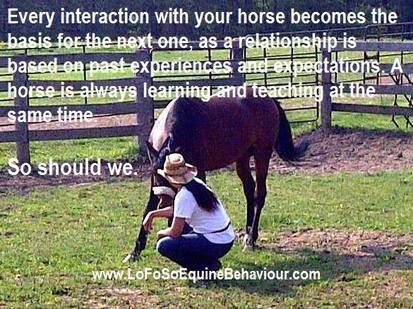Horse Behavior & Nutrition Tips, Facts & Advice with Scientific Approach
Welcome, my name is Mila Bon, Equine Behavior Consultant. On this web site I am sharing tips, facts and advice on horse behavior, training, feed and nutrition. You will find information about horse behavior, tips about horse care, examples of stress free horse training, horsemanship backed by science, facts on how the horse learns and advice on how horse nutrition and what you feed your horse may influence its health as well as its behavior. I combine 45 years of horse experience with 5 years of equine education from the University of Guelph (see: About Me). Located near Toronto, Barrie & Orangeville, Ontario, Canada.
Equine Behavior Consultant versus Horse Trainer. What's the difference?
 Mila Bon working with an 'aggressive' stallion
Mila Bon working with an 'aggressive' stallion
A Horse Trainer teaches a horse new responses or finds a quick fix for any issues it may have, versus an Equine Behavior Consultant that helps the horse as well as its owner with undesired behavior by having a holistic approach and by first looking at what may have contributed to the cause of the issues. From the horse having had a bad experience, former abuse, pain (or the memory of what caused pain in the past!), fear, any kind of stress, ill fitting tack, overexertion, health problems, over-conditioning, conflicting cues during training or handling, but also nutritional imbalance or feeding practices.
An Equine Behavior Consultant looks at all of these aspects. In order to be able to do this, he/she has studied not only horse behavior, but also nutrition, anatomy, physiology, health & disease prevention and much more. This holistic approach, seeing the horse as a whole, not just the sum of its parts, provides a better understanding of the cause of the undesired behavior. This will help in finding a solution that fits the horse as well as its owner.
Horse Behavior Modification will only be successful if the solution is also based on the owners' experience, abilities, schedule, budget, cooperation of the boarding facility (if applicable) and/or environment the horse lives in. The Consultant needs to be able to think outside the box and offer evidence based creative solutions.
An Equine Behavior Consultant looks at all of these aspects. In order to be able to do this, he/she has studied not only horse behavior, but also nutrition, anatomy, physiology, health & disease prevention and much more. This holistic approach, seeing the horse as a whole, not just the sum of its parts, provides a better understanding of the cause of the undesired behavior. This will help in finding a solution that fits the horse as well as its owner.
Horse Behavior Modification will only be successful if the solution is also based on the owners' experience, abilities, schedule, budget, cooperation of the boarding facility (if applicable) and/or environment the horse lives in. The Consultant needs to be able to think outside the box and offer evidence based creative solutions.
LoFoSo™ stands for: Locomotion, Forage and Socialization
|
Even though horses have been domesticated for almost 10,000 years and selective breeding has resulted in morphological differences between horse breeds, the horse today does not differ much from its wild horse ancestors when it comes to horses' ethological needs (the need for the horse to be able to express 'normal' horse behavior patterns). The balance between Locomotion, Forage and Socialization (LoFoSo) in a horse's past and its present greatly influences its behavior. Imbalance is certain to result in behavioural changes (so called 'bad horse behavior' or 'undesired horse behavior') and research has shown that this influences horse welfare, horse learning abilities and performance. 'LoFoSo' imbalance in the horse's past may have long-term consequences for the horse's future behaviour and for horse welfare. Behavioural indicators (that often go unnoticed when they do not seem to directly influence performance, or the relationship with humans) can be analyzed to find the underlying causes of 'problem behaviors' observed by the horse owner, rider or handler. Mila Bon LoFoSo™ Equine Behaviour |
|